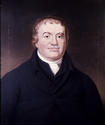 Born in Stewarton in Ayrshire, the son of a grocer, David Dale (1739-1806) trained as a weaver in Paisley and acted as a weavers' agent collecting finished cloth for the merchants. In 1763 he moved to Glasgow where he established a business importing Dutch and French linen yarn. His business thrived and in 1783 he was also appointed the first Glasgow agent of the Royal Bank of Scotland, having married the daughter of one of the directors. He became a substantial philanthropist, helping in the establishment of the Royal Infirmary and as a director of the city's poor house.
Born in Stewarton in Ayrshire, the son of a grocer, David Dale (1739-1806) trained as a weaver in Paisley and acted as a weavers' agent collecting finished cloth for the merchants. In 1763 he moved to Glasgow where he established a business importing Dutch and French linen yarn. His business thrived and in 1783 he was also appointed the first Glasgow agent of the Royal Bank of Scotland, having married the daughter of one of the directors. He became a substantial philanthropist, helping in the establishment of the Royal Infirmary and as a director of the city's poor house.
 Inevitably he interested himself with the new cotton coming from America and he and Richard Arkwright from Lancashire, the inventor of the water frame spinning machine, went into partnership to build a cotton mill at New Lanark. In partnership with others, other mills followed in Catrine, Blantyre, Newton Stewart, Oban, Stanley and Spinningdale in Sutherland. He also partnered George Mackintosh at his turkey-red dyeworks at Dalmarnock. None of his spinning mills was as successful as New Lanark. It was under Dale that New Lanark became something of a model that attracted world-wide interest. He provided some education for the four to five hundred pauper children who were employed at the mill and went out of his way to provide reasonable living conditions. His ideas were to be built upon by his son-in-law, Robert Owen who came to New Lanark in 1799.
Inevitably he interested himself with the new cotton coming from America and he and Richard Arkwright from Lancashire, the inventor of the water frame spinning machine, went into partnership to build a cotton mill at New Lanark. In partnership with others, other mills followed in Catrine, Blantyre, Newton Stewart, Oban, Stanley and Spinningdale in Sutherland. He also partnered George Mackintosh at his turkey-red dyeworks at Dalmarnock. None of his spinning mills was as successful as New Lanark. It was under Dale that New Lanark became something of a model that attracted world-wide interest. He provided some education for the four to five hundred pauper children who were employed at the mill and went out of his way to provide reasonable living conditions. His ideas were to be built upon by his son-in-law, Robert Owen who came to New Lanark in 1799.
 A dissenter from the established Kirk, Dale was a member of a sect called the "Old Scotch Independents" and he was a regular lay preacher. In 1799 he bought the Rosebank estate, near Cambuslang, and he died there in 1806. He is buried in the Ramshorn Churchyard in Ingram Street.
A dissenter from the established Kirk, Dale was a member of a sect called the "Old Scotch Independents" and he was a regular lay preacher. In 1799 he bought the Rosebank estate, near Cambuslang, and he died there in 1806. He is buried in the Ramshorn Churchyard in Ingram Street.